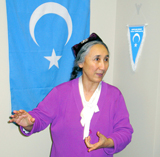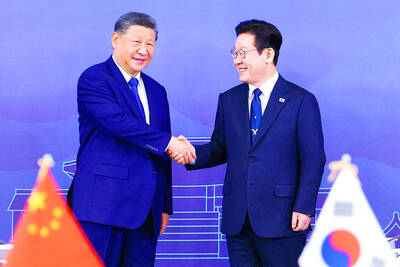It was a summer day in 1999 when Rebiya Kadeer headed for an appointment with US congressional researchers, who had come to the city of Urumqi to probe the plight of China’s Uighur minority.
Fearful she was being tailed, Kadeer took a taxi.
A large vehicle lunged toward them, but the cab driver quickly swerved, and it instead smashed into a car behind them, leaving a hand dangling lifelessly from the window.

PHOTO: AFP
Paying no heed to the injured, black cars suddenly surrounded the taxi and officers alighted with automatic weapons. Thus began Kadeer’s six years in prison, sometimes in a putrid 2.5m² cell, where she says guards regularly beat and stripped naked the female prisoners.
The events are described in Kadeer’s memoir, Dragon Fighter, just published in the US, the UK and other English-speaking nations by Kales Press, an affiliate of W.W. Norton.
In the book, she tells of a dramatic and diverse life from being a mother of 11 and a department store entrepreneur — she says she was once the richest woman in all China — to her transformation into the Uighurs’ most prominent dissident and a contender for the Nobel Peace Prize.
In the process she relates the story of the Uighurs, a Turkic and predominantly Muslim people who the latest US State Department report on human rights says are facing severe cultural and religious repression.
China abruptly freed Kadeer in 2005 ahead of a visit by former US secretary of state Condoleezza Rice. Now living in exile in the Washington area, Kadeer believes that Beijing regrets releasing her.
“My hope is that everyone in the world will learn about our situation through this book,” Kadeer said from her guarded office near the White House.
The slightly built 62-year-old, whose tiny workspace has two iMac computers, three megaphones and a framed photo of her meeting former US president George W. Bush, becomes animated when speaking of her homeland.
“When I tell people of the suffering of our people, sometimes people in the West, because of the freedoms they take for granted, feel that this is just a fantasy,” she said.
“When five or 10 people get killed in a war zone, people immediately find out and voice deep sympathy,” she said.
“But with us it’s very different — China’s totalitarian government has been systematically destroying the Uighur people for six decades, so the international community doesn’t know our situation very well,” she said.
Kadeer on May 21 will come full circle from her arrest for trying to meet congressional researchers — she plans to open a general assembly of the World Uighur Congress from within the US Capitol complex.
But in another eerie parallel, Kadeer in her book relates what she calls an assassination attempt in Washington in which a van slammed into her car; she said she and her assistant ran for their lives.
Kadeer says Chinese agents have surveyed her home and tapped her telephone. Five of her children remain in the Uighur region of Xinjiang, including two who are in prison, in what Kadeer says is a way to pressure her.
Chinese authorities have described Kadeer as a “separatist monster” and accused her of using Islamic “terrorism” to bring independence to Xinjiang.
Kadeer dwells little on Islamic identity in her memoir, in which she tells Uighur folk fables. In one poignant episode, she relates switching from reciting the Koran in prison to offering a Uighur shamanistic prayer of pre-Islamic origin.
She accuses China of using the attacks of Sept. 11, 2001, as a pretext to crackdown on Uighurs.
In prison, she said she was submitted to reeducation classes in which inmates were told not to believe in God and had to chant aloud 50 times: “We never want to separate from China!”
Dragon Fighter, which was written with the assistance of author Alexandra Cavelius, was originally published in German by Random House in 2007.
The English version includes a foreword written by the most famous exile from Chinese rule, Tibetan spiritual leader the Dalai Lama.
Kadeer voiced hope that the the book would eventually be translated into Chinese.
She said a Chinese official made her pledge when she left that she would do nothing in exile to harm the Chinese people — and she says she has kept her promise.
“I am not fighting against the Chinese people,” she wrote. “Rather — just like many Chinese people themselves — I am fighting for a democratically based government and for the unequivocal observance of human rights,” Kadeer said.

‘CHILD PORNOGRAPHY’: The doll on Shein’s Web site measure about 80cm in height, and it was holding a teddy bear in a photo published by a daily newspaper France’s anti-fraud unit on Saturday said it had reported Asian e-commerce giant Shein (希音) for selling what it described as “sex dolls with a childlike appearance.” The French Directorate General for Competition, Consumer Affairs and Fraud Control (DGCCRF) said in a statement that the “description and categorization” of the items on Shein’s Web site “make it difficult to doubt the child pornography nature of the content.” Shortly after the statement, Shein announced that the dolls in question had been withdrawn from its platform and that it had launched an internal inquiry. On its Web site, Le Parisien daily published a

China’s Shenzhou-20 crewed spacecraft has delayed its return mission to Earth after the vessel was possibly hit by tiny bits of space debris, the country’s human spaceflight agency said yesterday, an unusual situation that could disrupt the operation of the country’s space station Tiangong. An impact analysis and risk assessment are underway, the China Manned Space Agency (CMSA) said in a statement, without providing a new schedule for the return mission, which was originally set to land in northern China yesterday. The delay highlights the danger to space travel posed by increasing amounts of debris, such as discarded launch vehicles or vessel

RUBBER STAMP? The latest legislative session was the most productive in the number of bills passed, but critics attributed it to a lack of dissenting voices On their last day at work, Hong Kong’s lawmakers — the first batch chosen under Beijing’s mantra of “patriots administering Hong Kong” — posed for group pictures, celebrating a job well done after four years of opposition-free politics. However, despite their smiles, about one-third of the Legislative Council will not seek another term in next month’s election, with the self-described non-establishment figure Tik Chi-yuen (狄志遠) being among those bowing out. “It used to be that [the legislature] had the benefit of free expression... Now it is more uniform. There are multiple voices, but they are not diverse enough,” Tik said, comparing it

RELATIONS: Cultural spats, such as China’s claims over the origins of kimchi, have soured public opinion in South Korea against Beijing over the past few years Chinese President Xi Jinping (習近平) yesterday met South Korean counterpart Lee Jae-myung, after taking center stage at an Asian summit in the wake of US President Donald Trump’s departure. The talks on the sidelines of the APEC gathering came the final day of Xi’s first trip to South Korea in more than a decade, and a day after his meeting with the Canadian prime minister that was a reset of the nations’ damaged ties. Trump had flown to South Korea for the summit, but promptly jetted home on Thursday after sealing a trade war pause with Xi, with the two